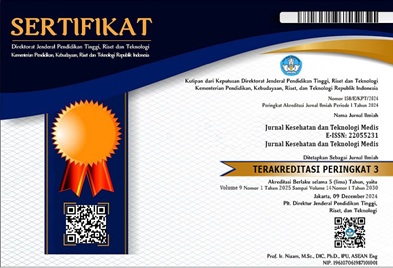ANALISIS FAKTOR YANG MEMPENGARUHI UPAYA SKRINING PENYAKIT TIDAK MENULAR DI WILAYAH KERJA PUSKESMAS SISO
Kata Kunci:
Skrining PTM, Faktor Risiko, Health Belief ModelAbstrak
Deteksi dini penyakit tidak menular dapat dilakukan dengan melakukan skrining PTM di posbindu maupun tempat pelayanan kesehatan lainnya. Skrining penyakit tidak menular dipandang perlu dilakukan mengingat prevalensi penyakit tidak menular yang semakin meningkat. Penelitian ini bertujuan untuk menganalisis faktor yang mempengaruhi upaya skrining penyakit tidak menular pada masyarakat di wilayah kerja Puskesmas Siso kecamatan Mollo Selatan kabupaten Timor Tengah Selatan, NTT berdasarkan teori Health Belief Model. Metode penelitian ini adalah cross sectional. Pengambilan sampel dilakukan secara simple random sampling yang selanjutnya dilakukan analisis data menggunakan univariate, bivariate, dan multivariate dengan uji statistik chi-square. Hipotesis dalam penelitian ini adalah ada pengaruh perceived susceptibility, perceived seriousness, perceived benefits, perceived barriers, self efficacy dan cues to action dengan skrining PTM pada masyarakat berdasarkan Health Belief Model di wilayah kerja Puskesmas Siso.
Early detection of non-communicable diseases can be done by screening for NCDs at posbindu and other health service places. Non-communicable disease screening is seen as necessary considering the increasing prevalence of non-communicable diseases. This study aims to analyze the factors that affect the efforts to screen for non-communicable diseases in the community in the working area of the Siso Health Center, South Mollo District, South Central Timor Regency, NTT based on the Health Belief Model theory. The method of this research is cross sectional. Sampling was carried out by simple random sampling which was then analyzed using univariate, bivariate, and multivariate with chi-square statistical tests. The hypothesis in this study is that there is an influence of perceived susceptibility, perceived seriousness, perceived benefits, perceived barriers, selfefficacy and cues to action by screening NCDs in the community based on the Health Belief Model in the working area of the Siso Health Center.





